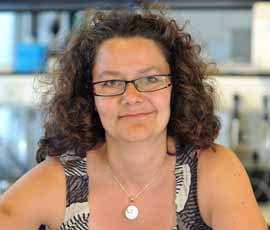‘Bone healing’ materials engineer wins top engineering award
A medical materials engineer who pioneered a form of bone graft with enhanced structure and chemistry to boost healing, has scooped a top award for successfully taking her innovation into the marketplace.

Dr Karin Hing
Dr Karin Hing, a senior lecturer in biomedical materials at Queen Mary, University of London has been awarded one of four 2011 Silver Medals by the Royal Academy of Engineering for being the “technical linchpin” behind an orthobiologics company sold recently for more than £200m.
Karin, aged 42, used her research into the bioactivity of bone graft substitutes - materials used in orthopaedic surgery as scaffolds for guided bone regeneration - to develop the hypothesis that bone healing could be enhanced through optimisation of both graft pore structure and chemistry, and invented a novel production route for the manufacture of these pore structures.
In 1999, Karin was one of a handful of founding scientists who began engaging with venture capitalists in order to advance the technology. In 2001, ApaTech was formed and it was not long before grafts with these innovative structures (ApaPore™) went into clinical use and were quickly adopted for bone repair. In 2005, a second product with enhanced chemistry, Actifuse™ also went into use, delivering better and more cost-effective results than previous devices.
In the 10 years before ApaTech was sold for £200m, Karin had helped it grow to employ 160 people in nine countries with an annual revenue of £40m. In that time, more than 120,000 patients had been treated with ApaTech products.
Nominating Karin for the award, Professor Jeremy Kilburn, Executive Dean for Science and Engineering at Queen Mary, University of London, said: “Karin was the technical linchpin of the team of founding scientists behind the commercialisation of ApaTech.
“Karin has always been driven by the need to understand the ‘how’ behind the success of these materials and has maintained a reputation as a keen independent research active scientist. A strong base of scientific understanding has been essential to the commercial success of ApaTech. Her role in this process has been invaluable.”
Professor Dame Julia Higgins FREng, who chairs the Academy’s Awards Panel, said: “We are delighted to award one of the four 2011 Silver Medals to Karin for her work in developing a new medical technology and successfully taking it to market.
“The engineering community needs entrepreneurs such as Karin to help inspire the next generation of world-leading engineers in the UK.”
On learning of her selection for this award, Karin said: “I am honoured to receive this award, and am keenly aware that it was the multidisciplinary team of colleagues and collaborators that I have been fortunate enough to work with that made it possible to translate an idea from the lab into the clinic. What fascinates me is the seemingly effortless way in which our bodies produce and maintain bone, a perfectly elegant engineering solution, while we struggle to patch up fractures with relatively clumsy lumps of metal and cement.
“The future has to be in truly understanding the delicate balance of mechanics, fluidics and chemistry that controls bone physiology so that we can guide bone repair and regeneration with equal finesse. However, the more we try to comprehend it the more I appreciate how cunning an engineer nature really is. There is plenty to do and much to learn.”
Karin will receive her Silver Medal at the Academy’s annual awards dinner in London’s Guildhall on June 6. She is only the third woman to receive the Academy’s Silver Medal.
Related items

27 June 2025
For media information, contact:

